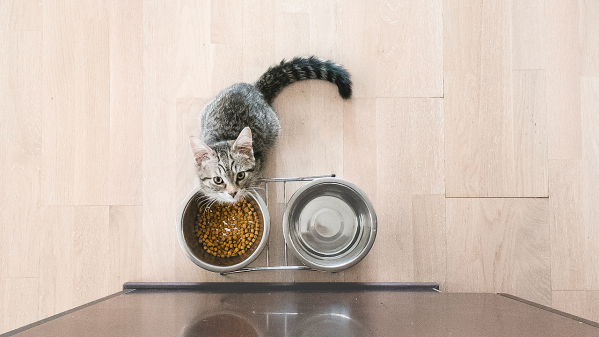If you just brought your new kitten home and you’re noticing that they're not eating, you might begin to worry. There are a variety of reasons why a kitten won't eat, so don’t panic. Some of these potential causes have simple solutions you can try at home.
It’s important to note: if your new kitten isn’t eating for more than a day, it's a good idea to get a vet’s professional opinion as to what might be causing this. It's best to be sure that there's no serious underlying cause for your kitten not wanting to eat.
Here, we'll focus on non-illness related reasons why your new kitten is not eating and what you can do about it. If you want specific guidance about your individual cat, you should reach out to their vet or speak to a pro at Pawp for advice.
Why your new kitten isn’t eating & what you can do
Remember, if your kitten has not eaten for more than 24 hours or has any other symptoms, you need to get them to a vet sooner rather than later to make sure there's no serious underlying cause that needs to be treated.
Let’s look at some non-illness related reasons your kitten won't eat.
Your kitten is still learning to eat
Kittens are usually weaned at around 6 weeks of age. They will still be learning to eat solid food at this age and might be trying to figure out what they like and don’t like.
It's important to ask the breeder or shelter where you got your kitten from about the food they ate prior to coming home with you. Try to get some of the same food (even if it's not what you want to feed them long-term). Feed them the same food for the first few days and then slowly transition them over 7-10 days to the food of your choice.
Kittens that are still struggling with solid foods might benefit from having a kitten milk replacer mixed with some soft food. You can slowly start to add more soft food to the mixture over a few days until they get the hang of eating properly. If you prefer to feed dry food, you can mix the kibble with the milk replacer and slowly reduce the amount of milk replacer to get them used to dry food.
You can try to warm your kitten’s food a little by adding warm water or placing the food in the microwave for a few seconds. Be sure to mix the food properly to make sure there are no hot pockets after microwaving and test the temperature before offering it to your kitten. Heating the food slightly will help to release the smell of the food and can sometimes be enough to get a reluctant kitten to start eating.
Your kitten doesn’t have a routine yet
One of the reasons why your kitten might not be eating when you bring them home is that they're not in a routine yet. Your kitten needs to eat regularly. This is required to support both their energy and growth needs.
It’s definitely tempting to leave food out for your pet to graze on as they choose. It seems like a great idea, but in reality, it could actually hinder them. This is because they will not have the opportunity to develop a routine which can actually provide them comfort. In addition, your kitten could either over or under eat as a result.
Instead, you should create a well-thought-out kitten feeding schedule that you know you can really stick to. Not only will this help your kitten build trust in you, but it will also help every day seem more manageable to them.
The kitten’s feeding schedule should depend on how old they are. Young kittens that are just eight weeks old and below will need to be fed somewhere between three and four times per day. As your kitten gets older (at around 12 weeks of age) you can start decreasing the frequency to around twice daily or as it fits in with your family schedule.
You should also keep in mind that your kitten will typically have to use the litter box after they eat. This is an excellent opportunity to help your cat get some litter box training after their feeding time.
Your kitten's food bowl isn’t right
Most kittens don't like when their whiskers touch the sides of their bowl every single time they reach down to eat. Whiskers are very sensitive antennas, and they allow the kitten to get practical information from their environment.
If your cat is continually “activating” these antennas while they're eating, this could potentially make them reluctant to eat. Therefore, you should choose a food bowl that’s right for your cat.
Consider getting one that is both wide and shallow instead of one that’s tall and deep. That will help ensure your cat’s whiskers aren’t constantly touching the bowl.
Your kitten's dish is dirty
Cats are extremely clean creatures. If a kitten isn’t eating their meal, sometimes it's because they’re protesting a dish that they don’t feel has been washed correctly. Every time you clean the dish, be sure to use a safe detergent and rinse it extremely well with water.
This should be completed after every meal. You can also pick up a ceramic or stainless steel bowl for your cat—this will help ensure that your cat’s bowl doesn’t hold scent the same way a plastic one might.
Your kitten dislikes their bowl placement
Where you put your cat’s food bowl matters to them. You should be sure that the location of your kitten’s bowl is not near their litter box, and it shouldn’t be where people walk all the time. That way, they can relax while they're eating without being disturbed.
You should also keep in mind that if there are other pets in your home, your kitten would rather eat alone, especially if they're newly introduced to the household. It might even be necessary to let them eat in a different room behind a closed door for a while.
Your kitten is stressed or anxious
Transitioning to a new home can be intimidating or scary for a little kitten. It’s completely normal if your kitty feels a bit unsettled when they first get to their new home. This sometimes manifests itself as a lack of appetite.
To remedy this, you can ask the breeder or shelter where you got your cat from for an object or blanket they know. Always make sure your kitten has an area where they can get away from everyone in the household and rest quietly for a while if they're feeling overwhelmed.
As mentioned before, feed your kitten separately from other pets in a different room with a closed door. You can feed the new kitten and other pets on opposite sides of the door where they can hear and smell each other. This can help form a positive association with the other pets, as feeding time is generally a positive experience.
You can also consider the use of natural pheromones which can help reduce stress. The pheromones are usually used in the form of a spray, a diffuser that is plugged into a wall socket or a collar you can put around your kitten’s neck.
Talk to a vet
If you're uncertain why your kitten isn't eating and need some advice, it’s a great idea to talk to a vet. That can provide you with some peace of mind and help your kitten start eating again.

Reviewed and fact-checked by
Dr. Mari, DVM at Pawp
